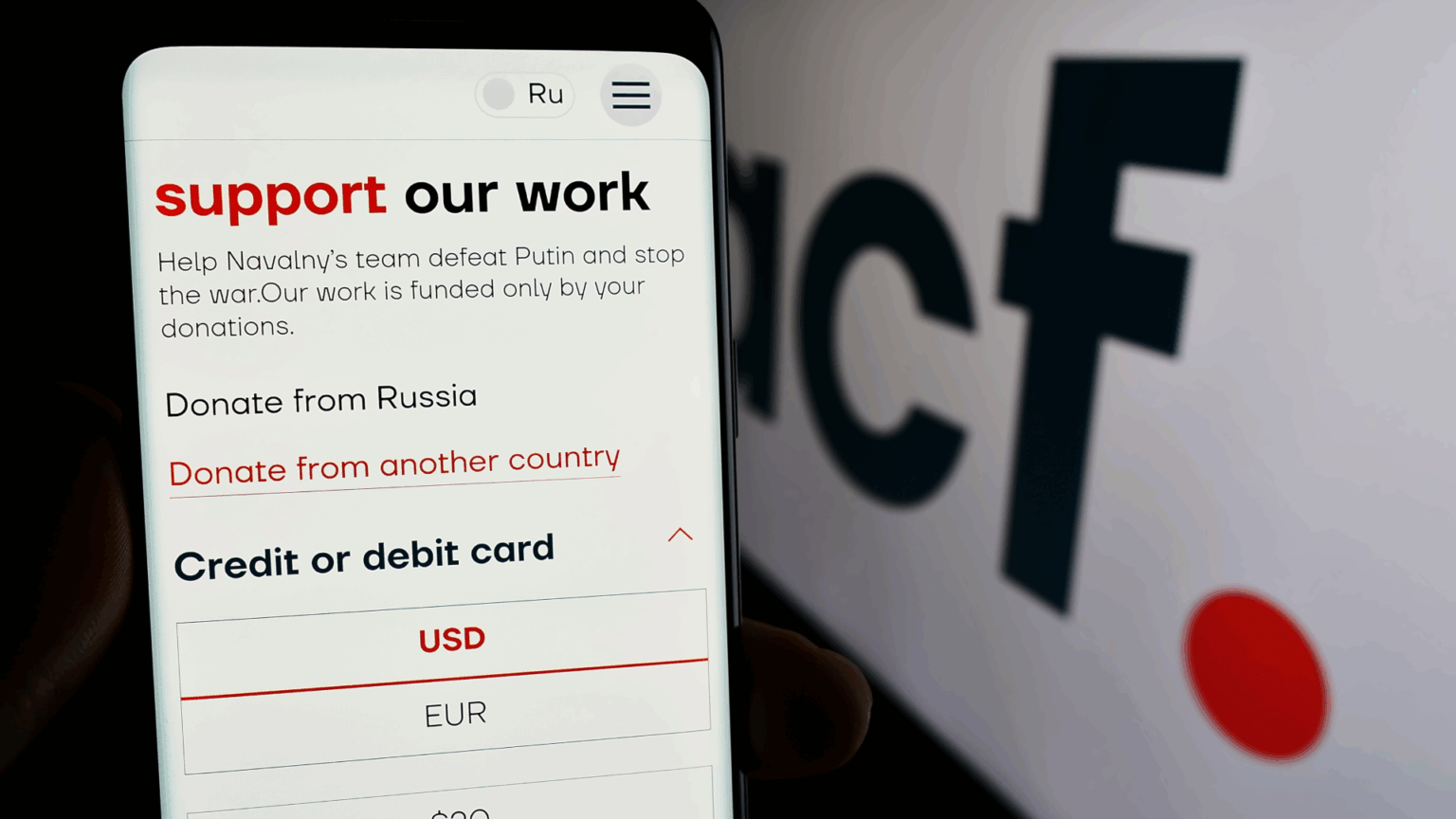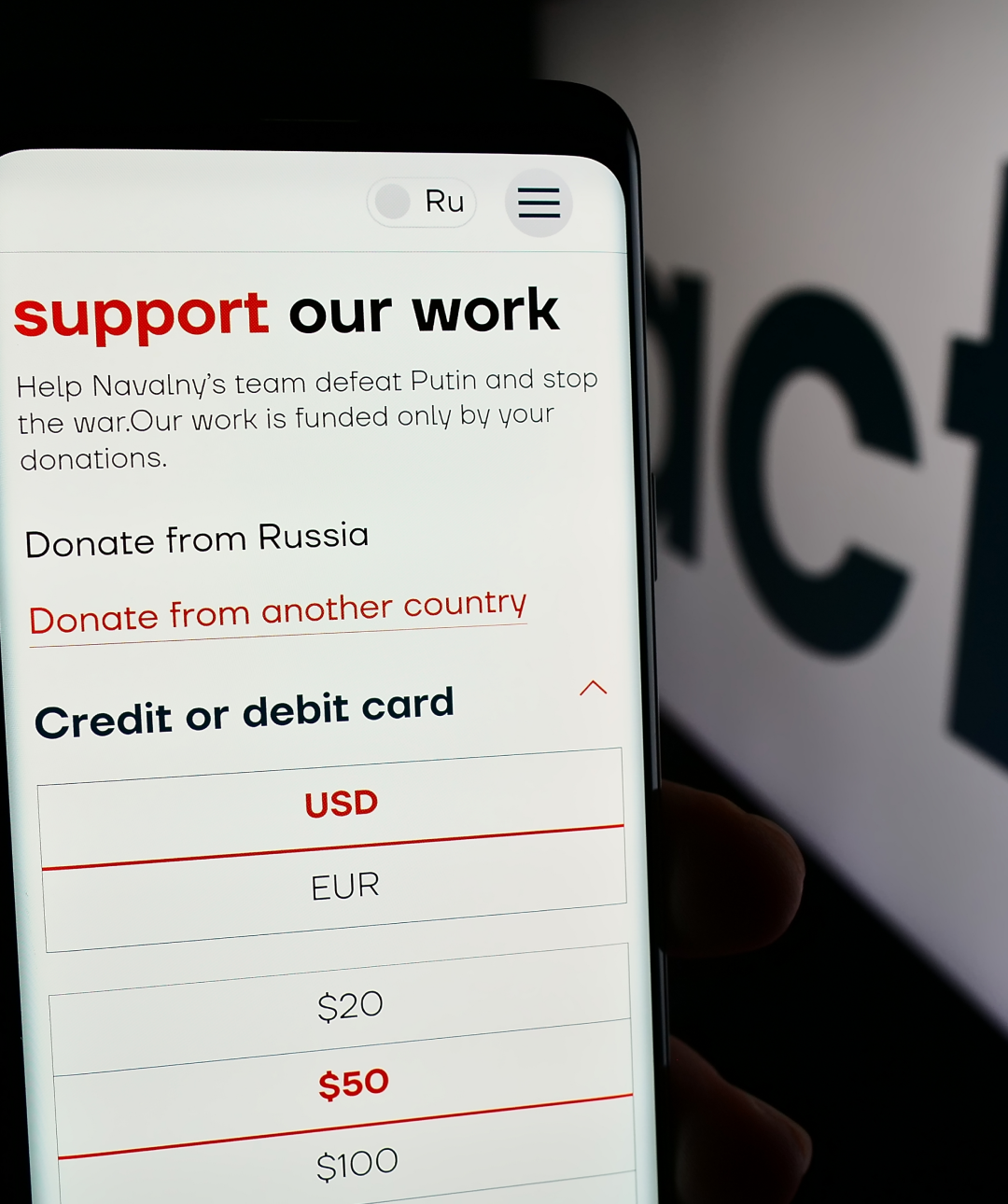Good morning, readers!
A Russian court sentenced Dmitry Marsov, a father of five, to three years in prison for donating merely $20 to Alexei Navalny’s Anti-Corruption Foundation, an act now considered terrorism under laws targeting so-called “extremist groups.” The case shows how authoritarian regimes weaponize financial surveillance to punish dissent, silencing even the smallest acts of civic participation.
Meanwhile, in Georgia, tax officials froze the bank accounts of independent news outlet Batumelebi/Netgazeti over outstanding tax debt, just days after its founder, Mzia Amaghlobeli, was jailed after a pro-democracy protest. The timing suggests this was less about taxes and more about shutting down dissenting media, dealing another blow to press freedom in the country.
In freedom tech news, Bitcoin developers are preparing for the expected threat of quantum computing. A new proposal called SPHINCS+ would replace Bitcoin’s current signature system with one built on hash functions, which are more resistant to quantum attacks. The tradeoff is larger signatures and more on-chain data, raising scalability questions. As the quantum threat becomes more real, proposals like this may shape the next chapter of Bitcoin’s evolution.
We end with an interview on the Innovate Asia podcast where Hugo, a Burmese citizen, shares how Myanmar’s military coup upended his life and led him to discover Bitcoin. He discusses how it became a practical tool for navigating financial repression and how the Burmese community is now organizing grassroots education to help others use Bitcoin as a means of saving and transacting under repression.
Let’s dive in.
Global News
Russia | Sentences Man to Three Years in Prison for Donation to ACF
A Moscow court sentenced Dmitry Marsov, a father of five, to three years in prison for donating 1,500 rubles ($20) to Alexei Navalny’s Anti-Corruption Foundation (ACF), a leading opposition group and nonprofit. Marsov made small monthly donations to ACF but stopped when he learned the Kremlin labeled it an “extremist group,” a politically motivated designation used to suppress dissent and undermine independent voices. Despite this, the court treated his support as a criminal act. This sentence shows how authoritarian states weaponize financial surveillance to the detriment of democracy, as the ability to donate privately to causes is essential. The sentence comes as Russia tightens control over digital life more broadly, passing a new law that criminalizes VPNs for accessing “extremist materials” and preparing to ban WhatsApp, which is used by nearly 100 million Russians. By treating a small donation as a criminal act, the Russian state sends a clear message: challenging those in power will cost you your freedom.
El Salvador | Top Human Rights Group Flees Country
Cristosal, El Salvador’s leading human rights organization, officially fled the country amid escalating financial and legal repression under President Nayib Bukele. This comes after months of alleged harassment, surveillance, and legal threats, including the jailing of its top anti-corruption lawyer, Ruth López. The organization reports years of state surveillance, including spyware like Pegasus, defamation campaigns, and widespread abuses during Bukele’s mass anti-gang crackdown, but says recent legal threats made continued work impossible. The retreat follows El Salvador’s adoption of a “foreign agents” law modeled on legislation used in dictatorships like Nicaragua and Russia to criminalize groups and individuals receiving international funding. In addition to Cristosal fleeing, more than 100 journalists, activists, lawyers, and academics also recently fled. Cristosal’s departure marks a profound erosion of accountability mechanisms in El Salvador, as Bukele’s administration resorts to financially and legally pressuring NGOs to consolidate civil society under authoritarian rule.
Georgia | Freezes Bank Account of Independent Media Outlet
Pakistan has announced a pilot for a central bank digital currency (CBDC), with the State Bank preparing to test a digital rupee as part of its “financial modernization” efforts. At the same time, the regime has established a new regulatory body, the Pakistan Virtual Asset Regulatory Authority (PVARA). This watchdog will license and monitor all virtual asset service providers under strict new guidelines. Together, these developments give the state tighter control over how people store, move, and access money. The PVARA’s power to approve or deny digital asset services could limit the accessibility of alternative financial tools like Bitcoin. And a CBDC opens the door to real-time surveillance of personal transactions, eliminating financial privacy. In a country where citizens already face high inflation, capital restrictions, and political instability, these regulations risk adding another layer of repression and a means to control economic behavior at the granular level.
Pakistan | Announces CBDC and New Digital Asset Watchdog
At the 17th BRICS Summit in Rio, Belarus proposed a cross-border payment system based on central bank digital currencies (CBDCs), aiming to reduce the union’s dependence on Western financial networks. BRICS is an intergovernmental economic organization led by the Chinese and Russian regimes. “In order to improve the financial infrastructure of the BRICS member countries, Belarus proposes to consider the possibility of integrating central bank digital currency platforms as they become legally and technically ready for integration,” said Maxim Ryzhenkov, Minister of Foreign Affairs of the Republic of Belarus. This proposal is dangerous for human rights and financial freedom because it would deepen financial surveillance and censorship across authoritarian-leaning regimes. By promoting CBDC-based systems (a financial tool that gives central banks granular control over users’ transactions), BRICS likely seeks to build a cross-border financial network that eliminates privacy, allows for programmable restrictions, and can be weaponized against dissidents, journalists, or civil society groups.
Malaysia | One-Time Cash Handout to Ease Cost of Living
Malaysia’s government is responding to mounting cost-of-living pressures with a one-off cash handout of 100 ringgit ($24) to all adults in the country. Prime Minister Anwar Ibrahim announced the measure just days before a major protest was planned and thousands of people were expected to rally in Kuala Lumpur against deteriorating financial conditions. The government will now spend 15 billion ringgit on cash aid in 2025 (2 billion more than originally budgeted). The handout also has restrictions: it is redeemable at around 4,000 stores and expires at the end of 2025. It comes on top of more price controls as well, with officials promising to cut petrol prices and freeze highway toll rates. While these measures may ease short-term pain, they could worsen inflation by driving up demand for goods and services with newly printed money. The concept of government handouts that can only be spent on certain items or with certain merchants should be a chilling sign of what’s perhaps more to come in the future.
Recommended Content
Why the Burmese People Need Bitcoin More Than Anyone
In this podcast episode of Innovate Asia, Burmese citizen Hugo shares how Burma’s military coup upended his life and led him to discover Bitcoin. After losing his internet business to airstrikes and fleeing to Thailand, Hugo faced severe financial exclusion. He could not open a bank account, access stable currency, or receive cross-border payments. He discusses how Bitcoin became a practical tool for navigating financial repression and how the Burmese community is now organizing grassroots education to help others use it as a means of saving and transacting under repressive states. Watch the full interview here.
Bitcoin and Freedom Tech News
SPHINCS+ | Bitcoin Post-Quantum Signature Scheme
Bitcoin may one day need to upgrade its security to defend against quantum computers. This is because, today, Bitcoin relies on ECDSA cryptography that could be broken if powerful enough quantum machines are developed. SPHINCS+ is a quantum-resistant proposal that would replace Bitcoin’s quantum-vulnerable elliptic curve signatures (which rely on math problems that quantum computers could solve) with a quantum-resistant hash-based signature scheme that can potentially remain secure even in a quantum future. But it comes with tradeoffs. Signatures using SPHINCS+ are much larger, which could impact how many transactions fit into each block and how efficiently the Bitcoin network runs. Developers are now exploring how to balance stronger security with Bitcoin’s need to stay lightweight and decentralized. While SPHINCS+ is not yet part of Bitcoin, it is a proposal worth exploring as Bitcoin begins to plan for long-term protection against quantum computing to ensure it remains a secure tool of financial freedom for those under authoritarian regimes. Those wanting to learn more about SPHINCS+ can view the Lightning developer Olaoluwa Osuntokun’s presentation at the Presidio Bitcoin Quantum Summit.
Spark | Implements Unilateral Exit
Spark, a new Bitcoin payment layer for fast and low-cost transactions, introduced a unilateral exit, which allows users to withdraw their funds back to the Bitcoin blockchain without relying on Spark or any third party. How it works is that when a user deposits Bitcoin into Spark, they now receive a pre-signed transaction that can be used to reclaim their funds independently after a timelock. This ensures that users retain access to their Bitcoin even if Spark becomes unavailable or operators refuse to process withdrawals. The feature is not retroactive (meaning existing users must redeposit to enable it). This makes Spark a more adequate tool for dissidents operating under authoritarian regimes, ensuring they can reclaim their funds even in the event of censorship or shutdown.
Bitchat | Launches on Apple App Store
Bitchat, a Bluetooth-based messaging app built by Twitter and Block founder Jack Dorsey, is now available on the Apple App Store. The app allows users to send encrypted messages over Bluetooth mesh networks without needing Internet access or centralized servers. Messages hop locally from phone to phone until they reach the intended recipient. This makes it possible to communicate in areas with limited Internet connectivity or where traditional platforms may be blocked by authoritarian regimes. For example, a similar app called Bridgefy was used during the 2019 Hong Kong pro-democracy protests to keep the flow of information alive and free from state interference. Bitchat’s expansion from GitHub and Testflight to the broader Apple App Store expands access to a freedom tool designed to support private, peer-to-peer communication for dissidents and human rights defenders, and is already being tested by activists in Cuba.
Floresta | Adds Encrypted P2P and Testnet4 Support
Floresta, a lightweight Bitcoin full-node implementation powered by Utreexo, released version 0.8.0, adding support for BIP 324. BIP 324 is an encrypted peer-to-peer (P2P) transport protocol that allows Bitcoin nodes (computers running the Bitcoin software) to communicate over encrypted channels. This is a major step forward for improving privacy and security at the network layer, helping protect metadata like IP addresses and node connections. The release also includes support for testnet4, Bitcoin’s newest test network. For dissidents running the Bitcoin software, Floresta provides a lightweight and now more private option to do so. It continues to lower the entry barriers to running Bitcoin, helping make the network more decentralized and censorship-resistant.
bitcoin++ | Announces Privacy Edition in Latvia
bitcoin++, a bitcoin developer conference series, comes to Riga for the first time on Aug. 7–8, 2025. It will take place just ahead of the Baltic Honeybadger conference and will embark on a technical exploration of Bitcoin’s privacy and peer-to-peer exchange. Bitcoin’s public ledger offers unmatched transparency, but that very transparency can undermine individual financial privacy, especially under authoritarian surveillance. bitcoin++ believes that “transacting privately is a cornerstone of freedom from tyranny and control.” Speakers include leading developers from projects like Cashu, Brink, and White Noise, sharing cutting-edge tools and research for making Bitcoin use more private, scalable, and censorship-resistant for human rights defenders. HRF is proud to be supporting this world-class deep-dive into Bitcoin privacy. Get your pass here.
Recommended Content
Sparrow Wallet Tutorial by BTC Sessions
In this tutorial, Bitcoin educator Ben Perrin (BTC Sessions) offers a comprehensive walkthrough of one of the most powerful self-custody tools in Bitcoin: Sparrow Wallet. The video covers everything from basic wallet setup to advanced features like multisig, unspent transaction output (UTXO) management, and node connectivity, making it a go-to reference for users at any stage of their self-custody journey. Human rights advocates and nonprofits searching for a secure and self-custodial way to hold Bitcoin can watch the full tutorial here. For more features, readers can watch the advanced tutorial as well.







